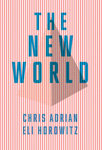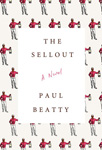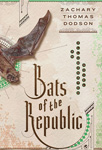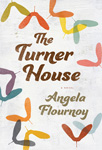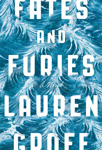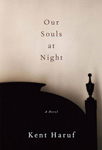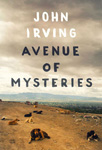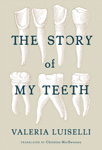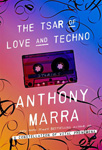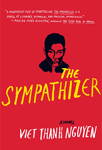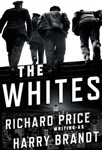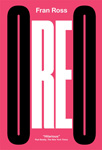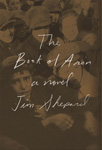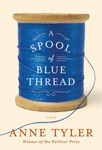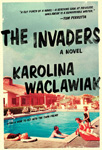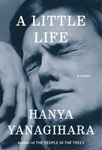by Chris Adrian and Eli Horowitz
Buy it at Powell’s »John Taylor: I came into this matchup having loved each author’s prior book (Anthony Marra’s A Constellation of Vital Phenomena and Hanya Yanagihara’s The People in the Trees). Coincidentally, A Little Life and The Tsar of Love and Techno also happened to be the only two books on the shortlist I read before the tournament. I bought the first when it was released, and I received the latter for Christmas.
I first read A Little Life during a week of vacation last April while visiting family in the Midwest, and I couldn’t put it down. At the time, I was nine months into my first year as an attending psychiatrist. My primary job is to provide psychiatric assessment and care in the emergency department of a tertiary care hospital. In a typical shift, I might see 10 to 20 patients, suicidal, psychotic, intoxicated, or withdrawing from some mixture of drugs, all presenting in extremis. As the year went on, patients and situations began to feel repetitive, exhaustion set in, and some amount of humanity got lost.
A Little Life was the perfect book at that moment because it acted, for me, as an empathy rejuvenator. Yanagihara does an immaculate job describing the life of her protagonist, Jude, whose formative years were devoid of secure attachment and suffused with overwhelming sexual abuse. She renders the abuse, and his subsequent self-injury, in excruciating detail. Jude’s motivations, and his attempts to cope with his life and pain, become relatable. It allowed me to better understand my patients and their maladaptive behavior. Crying at the end of the novel the first time around was cathartic.
I was haunted by the book, and judging from the online reaction to it (occasionally divisive, but generally fawning), I was not alone. I became kind of obsessed. I looked up the Instagram account, in which Yanagihara posts images she took as inspiration while writing the book, and people recreate scenes from the novel or photograph themselves with the now iconic cover in place of their faces. I found interviews with Yanagihara in print, on podcasts, and on talk shows.
This book gnawed at me for nine months, so I was eager to reread it for the tournament. Once again, I couldn’t put it down, but what once seemed whimsical and required me to think, “OK, I guess I’ll roll with this,” now felt occasionally exasperating. While Yanagihara makes Jude compelling and sympathetic, his surroundings—both characters and settings—were distractingly idyllic. In an effort to make the story timeless, or fable- or fairy tale-like, the novel starts out in our vaguely present day with all of the trappings of specific New York neighborhoods, real estate envy, food porn, the lifts given by attending the right schools, and rampant professional success, and progresses over 30-plus years without any specific markers of life in the early 21st century. In contrast, the abuse isn’t opaque: It’s precise, terrifying, and tough to read.
I’m not sure the novel can effectively be both a fairy tale and a deep dive into a traumatized psyche. Jude’s many relationships are too patient and forgiving. While internally, Jude is complicated and struggling to survive, his outward presentation is that of a high-maintenance enigma. Surely his three college roommates, all later charismatic and bizarrely successful, would have tired of Jude. Same for his mentor and primary care physician Andy (which, by the way, I’ve yet to meet the orthopedic surgeon who would run a single-patient practice and would let this go on for years without psychiatric intervention). With Jude’s refusal to open up and his pattern of rejecting help, they would’ve burned out long ago.
Certain illnesses (e.g., cancer), if they’re advanced enough and are likely to cause death, are given a prognosis of “terminal.” But physicians don’t prognosticate mental illness as terminal; sometimes we’ll acknowledge the seeming inevitability of suicide in retrospect, but it’s not like we have psychiatric palliative care or hospice for depression. In contrast, Jude is as terminal a patient as I can imagine. Which makes it impossible for me to square Yanagihara’s intention to write a realistic response to trauma—many people, even with treatment, don’t get better—with the adoptive, supportive environment he has managed to cultivate for himself. If the point is to say that even with money, a lover, an adoptive father, friends, and outward success, Jude can’t cope any better in his 50s than in his 20s, then fine. But in all likelihood, he never would’ve achieved any of this in the first place. His exterior adult life would have been one of despair. In writing a novel rooted in sexual trauma, Yanagihara has a responsibility to portray the entire realistically traumatized life. But it felt dishonest to portray childhood sex crimes and a battered psyche in gruesome detail and then the resulting external adult life with Vaseline on the lens. The inexhaustible sympathy and patience Jude finds in others is wishful, but a fantasy. The two competing styles—competing logics, really—of the book don’t mesh, and on second read the emotional resonance wasn’t there. The book felt like a curiosity.
The Hollywood pitch of The Tsar of Love and Techno would be something like “It’s Joseph Heller meets the Coen brothers!” but set in Chechnya and the Russian hinterlands instead of the upper Midwest. It’s a collection of interconnected short stories set initially in 1930s Russia, and then in the Russia and Caucasus of the 1990s to the present day. I breezed through this with some jealousy about Marra’s ability to write sharp sentences that pop:
The two sons smoke as if desperate to commit suicide but only by emphysema. Their mother only lets them smoke in the bathroom, which they’ve filled with a black-and-white television, a broken boom box, a dozen ashtrays, and a sawed-in-half sofa. It looks like something between an outdated disco and the office of a pornographer who’s seen better days.
The stories are grim, hilarious, and capture the inanity of working under a totalitarian regime and living without any control over one’s circumstances, where death can take anyone at an instant. These are hearty characters who, come to think of it, have a Minnesotan sensibility of putting their heads down and pushing on. They’re going to live in a mining town where over half the people die of lung cancer because that’s what they’ve always done, dammit. Marra’s ability to sustain dark humor across stories in which a mail-order bride returns to Russia and inadvertently gets herself murdered, or in which an untalented dancer wins a pageant and strikes it big as a movie star and wife to a wealthy man, only to eventually be shunted back to her diseased village, is remarkable. Sometimes, all I want is a good, heavy laugh with my bleak.
For me, reading these two books felt like being in two different headspaces. Reading A Little Life is like living without being able to get outside of your head, utterly absorbed in your own anxieties, leaving you paralyzed and numb. Reading The Tsar of Love and Techno conjured emotions similar to moving through the world and having flashes of recognition because someone said something, or you saw something, that triggered a memory. Though heightened and absurd at times, it struck me as more credible.
In the end, I’d recommend them both. With A Little Life, I’d recommend it because I want someone to argue about it with. But with The Tsar of Love and Techno, I’d recommend it because it’s just about perfect, and I’m putting it through to the next round.
Match Commentary
By Kevin Guilfoile & John Warner
Kevin: I once sat three rows behind John Taylor at a Bruce Springsteen concert. Not John Taylor the ToB reader judge and psychiatrist, but John Taylor the bassist in Duran Duran. He really did have magnificent hair.
Wow, it almost seems too perfect that this John Taylor, given his profession and expertise, got to wrestle with all the emotional trauma packed into A Little Life. Yet his experience of the book seems so similar to mine and yours and to opening-round judge Choire Sicha’s, and also the dozens of critics who have reviewed it. Perhaps that is why we find it such a fascinating novel to discuss and argue about, because there appears to be wide agreement about the analysis of the text: These are its “strengths,” these are its “weaknesses,” here is the way it makes us “feel.” Many of us are on the same page, as far as that goes, yet our reactions to the novel vary so widely. We can love it, we can hate it, we can feel extreme ambivalence toward it.
So often when someone tells us they hate a book that we love, it feels like a challenge to our intellect. We get defensive. I don’t feel that way when discussing A Little Life. I can say, “Yes, everything you say about it is absolutely correct, but I still liked it much more than you.” That’s such an interesting conversation.
I liked A Little Life more than you did, John. Why? Earlier in the tournament I made a reference to Ray Bradbury, and I think at some point I started thinking about these characters as if they were living on Mars, and specifically Bradbury’s kind of Mars, where some things were almost Earth-like, but the rules of verisimilitude were turned off. Reading the novel after that became less of an intellectual exercise—it was more like listening to music. It was about a feeling I had when I was reading, a feeling related to the humanity of the characters (characters who, in many ways, aren’t especially human-like), and my own humanity, as well.
John: Interesting that it’s a reread that’s brought down one of our pre-tournament favorites (though I think you’re about to deliver some Zombie-related news for A Little Life). I imagine if I reread A Little Life I might have a similar reaction, though without the expert psychiatry-based opinion that Judge Taylor brings to the table here. I think I’d probably just be thinking that Jude is contrived and kind of phony, that he is both too many things and not enough of anything.
The amazing opening round conversation in the comments helped me see a number of aspects of the novel from the “fan-fic” aspect to Jude and Willem’s coupling and the “genderless” aspects of a number of the relationships.
Is it the “great gay novel,” or is that bunk? What are the implications of considering it “torture porn?” Why does every male in Jude’s life prior to him meeting his friends take a particularly sadistic pleasure in abusing him? Is Yanagihara even in control of her own book?
Judge Taylor adds even more fodder into the discussion stew. I think we’ll be chewing on this one all over again.
Whatever one thinks of its quality, A Little Life is something significant. What it exactly is still isn’t clear to me.
Kevin: So The Tsar of Love and Techno makes it to the quarterfinals. This is probably appropriate. For reasons I cannot recall, Marra’s A Constellation of Vital Phenomena didn’t make the ToB shortlist in 2014, but it certainly could have, and in retrospect probably should have, so this is something like sweet, sweet vindication for him, or it would be if this were an award that anyone actually cared about winning.
John: My esteem for Tsar has only increased over time, sort of the opposite of my feelings for A Little Life. Each individual story satisfies—some a little more than others—when standing alone, but the way they relate to and build upon each other is impressive. It’s reminiscent of ToB winner A Visit From the Goon Squad. Perhaps we have a new favorite.
Kevin: You alluded to it earlier and you are correct. A Little Life received more votes in our Zombie poll than Our Souls at Night. If the Zombie Round were held today, Yanagihara’s novel would join Fates and Furies as our favorite Deadtime Reads (even as that would certainly go down as everyone’s least favorite Zombie Round pun). Sadly, Our Souls at Night makes a permanent exit from competition. Sniff.
Tomorrow A Spool of Blue Thread takes on The Sellout in the final quarterfinals match with television writer (and also the regular kind of writer) Danielle Henderson as the chooser.

The official 2016 Tournament of Books T-Shirt by book designer Janet Hansen. Order yours!


